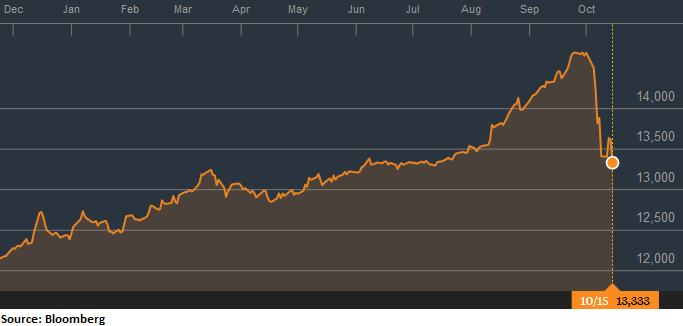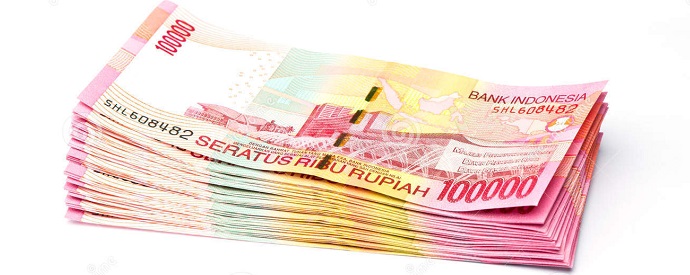Morgan Stanley & Moody's on Indonesia's Rupiah & Policy Package
Both Morgan Stanley and Moody's Investors Service have cast some negative perceptions on the condition of the Indonesian economy. First, American multinational financial services corporation Morgan Stanley released a report in which it stated that the recent rupiah rally will not last (Morgan Stanley maintains its year-end target of IDR 14,000 per US dollar). Then, global credit ratings agency Moody's criticized Indonesia's recently unveiled third policy package in which the government lowers energy prices for local manufacturers in a bid to support the industry.
The rupiah has strengthened to a three-month high after market participants started to believe that the Federal Reserve will delay a Fed Fund Rate hike until next year. Suddenly, higher-yielding emerging markets gained popularity resulting in a rally that started in early October (partly supported by the rising oil price up to 9 October).
Bloomberg Dollar Index:

However, Morgan Stanley believes that the rally will not last long, partly because it is the result of hurried short covering. Morgan Stanley said that Bank Indonesia's weekly balance sheet shows a significant tightening in reserve money/monetary base in the last week of September by IDR 58.5 trillion (approx. USD $4.3 billion). Regarding assets, Bank Indonesia's net foreign assets declined by IDR 20 trillion (approx USD $1.5 billion) in the same week.
Besides tighter system liquidity in the last week of September, offshore rupiah market liquidity was thin as well. Non-deliverable forward (NDF) liquidity at the start of October was nearly 50 percent lower than in September, while data from brokers suggest that daily trading volumes averaged between USD $300 million and USD $400 million last week, as compared to the usual trading volume of between USD $500-600 million. As such, thin liquidity in combination with the heavy short positioning, exaggerated the price action.

Meanwhile, credit ratings agency Moody's Investors Service said that the cheaper energy tariffs (which involves electricity as well as liquefied petroleum gas and fuel) that the Indonesian government offers to manufacturers in the third economic stimulus package imply risks for the government's financial balance sheets. Moreover, this policy is not in line with the government's subsidy reform program. Moody's does acknowledge, however, that the new policy is able to boost economic growth and curtail inflation in Southeast Asia's largest economy.
On Wednesday 7 October 2015, the Indonesian government unveiled its third stimulus package. This third installment focuses on reducing domestic operational costs for local industries. This helps local businesses to survive the current period of economic slowdown, hence averting more layoffs.
Earlier, however, Indonesian President Joko Widodo eagerly battled against the country's generous energy subsidies. He raised subsidized fuel prices in November 2014 and basically scrapped low-octane gasoline subsidies in January 2015 (when global petroleum prices were low) in order to free-up funds for structural economic development (such as much-needed infrastructure development).
Indonesia was granted investment grade-status by Moody's in 2011.
